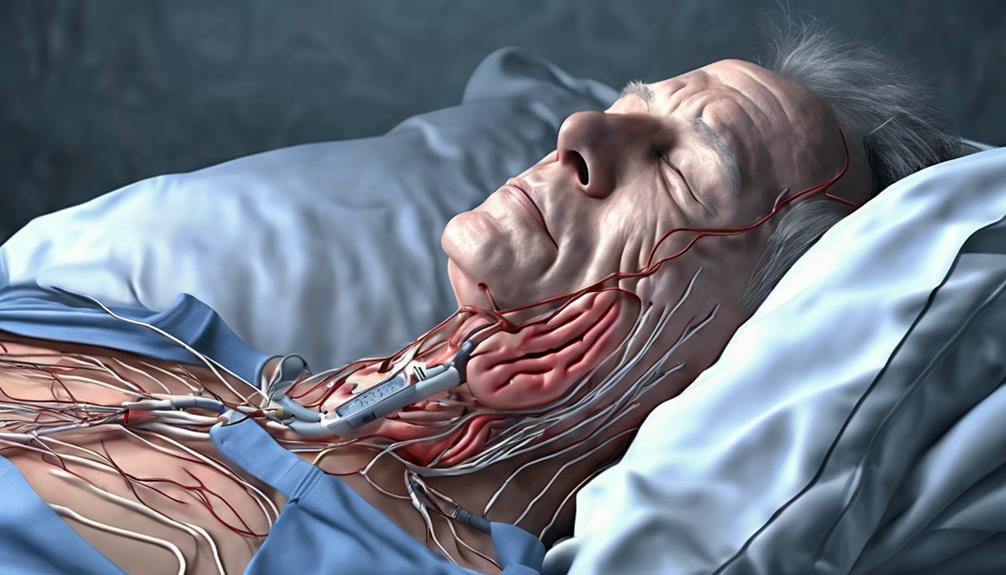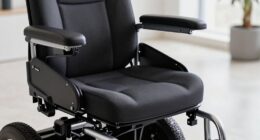Sleep apnea significantly increases the risk of atrial fibrillation (AFib), up to 4 times higher compared to individuals without sleep apnea. The heart experiences stress and pressure changes during sleep apnea, which can lead to AFib. Oxygen disruptions and activation of the sympathetic nervous system are also factors connecting sleep apnea to AFib. Shared conditions such as hypertension and obesity further elevate the likelihood of developing both conditions. Effective management through CPAP therapy and addressing common risk factors plays a crucial role in improving outcomes for AFib. More information on how sleep apnea causes AFib can provide valuable insights for better understanding and managing these conditions.
Key Takeaways
- Sleep apnea increases AFib risk by 2 to 4 times.
- Cardiac stress and oxygen fluctuations in sleep apnea contribute to AFib.
- Disrupted oxygen levels impact heart rhythm during apnea episodes.
- Shared risk factors like hypertension escalate chances of both conditions.
- CPAP therapy and managing common risk factors are crucial for improving AFib outcomes.
Understanding the Link Between Sleep Apnea and AFib
Our understanding of the link between sleep apnea and AFib has greatly advanced in recent years through various studies. Individuals with sleep apnea have a much higher risk, 2 to 4 times more, of developing atrial fibrillation (AFib).
The cardiac stress and pressure fluctuations experienced during breathing pauses in sleep apnea play an essential role in the development of AFib. These pressure changes can lead to alterations in the heart's structure and function, increasing the likelihood of arrhythmias such as AFib.
Studies have shown that disrupted oxygen levels, activation of the sympathetic nervous system, and other mechanisms further connect sleep apnea to AFib. Recognizing the shared risk factors, such as hypertension and obesity, is crucial as they escalate the chances of both conditions.
Treatment of sleep apnea, particularly with continuous positive airway pressure (CPAP) therapy, along with managing these common risk factors, is crucial in reducing complications and improving outcomes for individuals with AFib.
Mechanisms of Sleep Apnea-Induced AFib
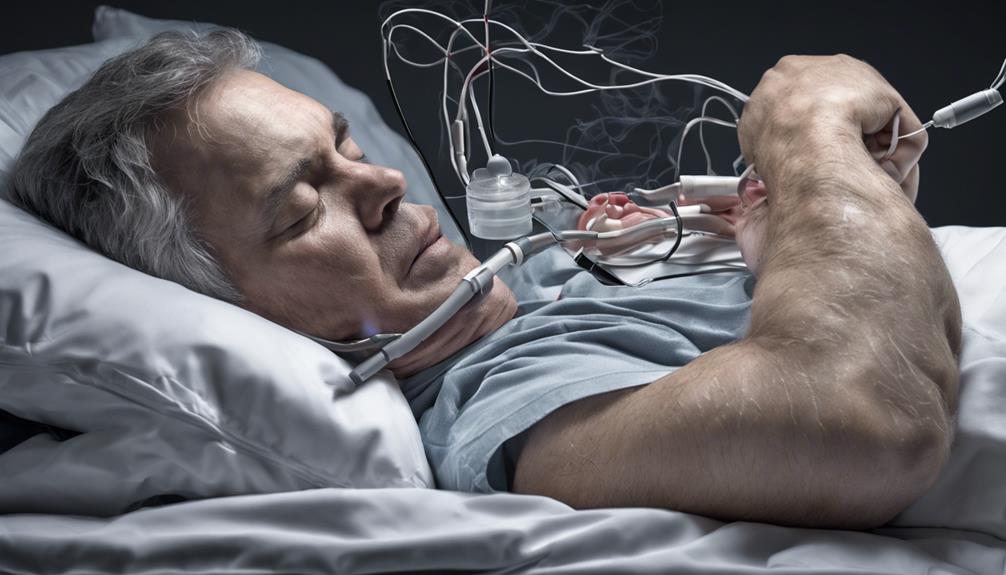
When considering the mechanisms of sleep apnea-induced AFib, it's vital to understand how apnea episodes and oxygen deprivation can trigger irregular heartbeats.
The stress caused by sleep apnea can activate the sympathetic nervous system, contributing to the development of AFib.
Additionally, inflammation, oxidative stress, and structural heart changes resulting from sleep apnea play significant roles in exacerbating AFib conditions.
Apnea and Arrhythmias
Moreover, crucial oxygen levels during episodes of apnea play a key role in inducing AFib by affecting the heart's rhythm and function. The irregular heartbeat in AFib can be triggered by the physical stress and changes in chest pressure during obstructive sleep apnea (OSA) events. Activation of the sympathetic nervous system exacerbated by OSA can contribute to arrhythmias like AFib.
The association between OSA, AFib, and sleep apnea treatment, such as positive airway pressure (CPAP), underscores the importance of managing OSA to reduce the risk of stroke and other cardiovascular complications. Additionally, the impact of untreated sleep apnea on the cardiac autonomic nervous system and the pulmonary vein can lead to structural heart changes, emphasizing the significance of lifestyle changes and timely interventions in addressing sleep apnea-induced arrhythmias.
Oxygen Deprivation Effects
Lack of oxygen during episodes of sleep apnea directly influences the heart's rhythm, increasing the susceptibility to atrial fibrillation. Oxygen deprivation from sleep apnea can lead to irregular heartbeats, impacting the heart's rhythm through various chemical responses. This deprivation also triggers changes in blood pressure, blood vessel constriction, inflammation, and structural alterations that contribute to the development of atrial fibrillation. Additionally, the physical stress caused by chest pressure changes during apnea episodes can exacerbate heart issues. Understanding how sleep apnea affects oxygen levels and induces these responses is essential for managing its impact on heart health. Below is a table summarizing the effects of oxygen deprivation in sleep apnea-induced atrial fibrillation.
| Effects of Oxygen Deprivation in Sleep Apnea-Induced AFib |
|---|
| Irregular heartbeats and heart rhythm disturbances |
| Changes in blood pressure and vessel constriction |
| Inflammation and structural heart changes |
Impact of Sleep Apnea on Heart Health
Experiencing sleep apnea can significantly impact heart health, especially concerning the development and management of atrial fibrillation (AFib). Sleep apnea increases the risk of AFib by 2 to 4 times, making it an important factor in heart disease.
Additionally, untreated sleep apnea can exacerbate existing AFib and hinder the effectiveness of treatment. It's essential to address sleep apnea as a comorbidity when dealing with AFib to optimize outcomes.
Continuous positive airway pressure (CPAP) therapy is the primary treatment for sleep apnea, which can also positively influence AFib management. Studies have shown that sleep apnea is an independent risk factor for cardiovascular disease, emphasizing the importance of diagnosing and treating it promptly.
The prevalence of obstructive sleep apnea (OSA) in patients with AFib underscores the need for coordinated care that considers both conditions together. Managing sleep apnea effectively can lead to better control of AFib and reduce the risk of recurrence, ultimately safeguarding heart health.
Risk Factors Associated With Sleep Apnea and AFIB
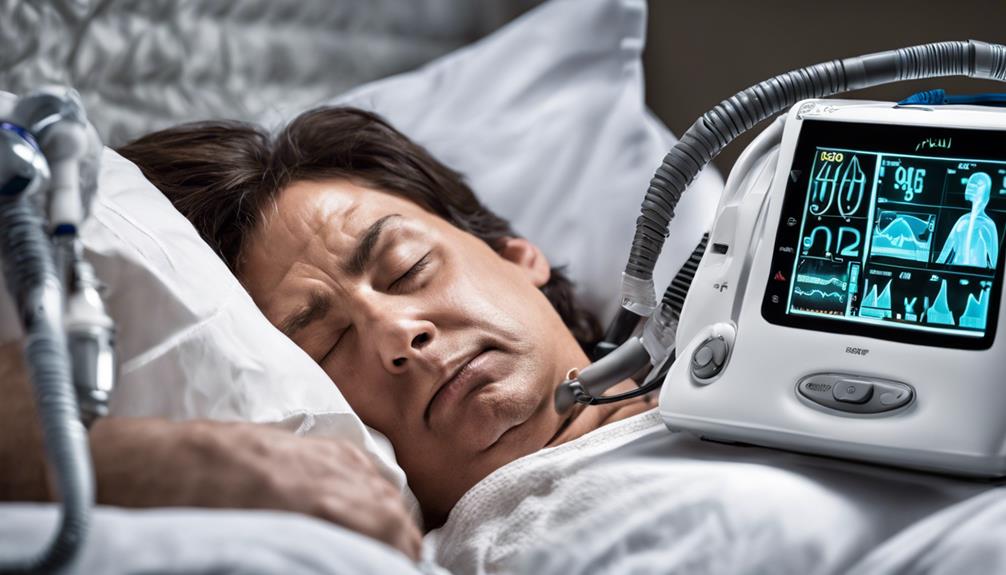
Common risk factors such as older age, obesity, hypertension, and heart failure contribute to both sleep apnea and AFib.
When hypertension and sleep apnea coexist, the risk of developing AFib is further heightened.
Understanding and addressing these shared risk factors are crucial in managing health implications and reducing the likelihood of AFib development.
Common Risk Factors
Understanding the shared risk factors between sleep apnea and AFib is key to effectively managing these conditions and improving overall health outcomes. Common risk factors such as older age, obesity, hypertension, and heart failure play a substantial role in the development and progression of both sleep apnea and AFib.
Individuals with coexisting sleep apnea and hypertension face an elevated risk of developing AFib. Lifestyle modifications, including weight loss and healthy habits, play a critical role in managing these shared risk factors. Obesity, in particular, poses a notable risk for both conditions, exacerbating their effects.
Health Implications
Disrupted oxygen levels during sleep apnea episodes can lead to irregular heartbeats and stress on the heart, contributing to the development of atrial fibrillation (AFib).
Individuals with sleep apnea are 2 to 4 times more likely to develop AFib, highlighting the significant impact of sleep disorders on cardiac health.
High blood pressure, elevated heart rate, and a positive airway pressure play roles in this relationship.
Managing common risk factors such as obesity, hypertension, and heart failure is key in reducing the incidence of both sleep apnea and AFib.
Recognizing the cardiac implications of sleep apnea underscores the importance of early diagnosis and appropriate treatment, such as CPAP therapy, to mitigate the risks and complications associated with these conditions. Sleep apnea warning signs, such as loud snoring, frequent awakenings, and excessive daytime fatigue, should not be ignored, as they may signal underlying cardiovascular risks. Prompt recognition and management of these symptoms can play a critical role in improving overall cardiac health and reducing the likelihood of long-term complications. By addressing sleep apnea early through interventions like CPAP therapy, individuals can significantly enhance their quality of life and lower the burden on their heart.
Treatment Approaches for Sleep Apnea-Related AFib
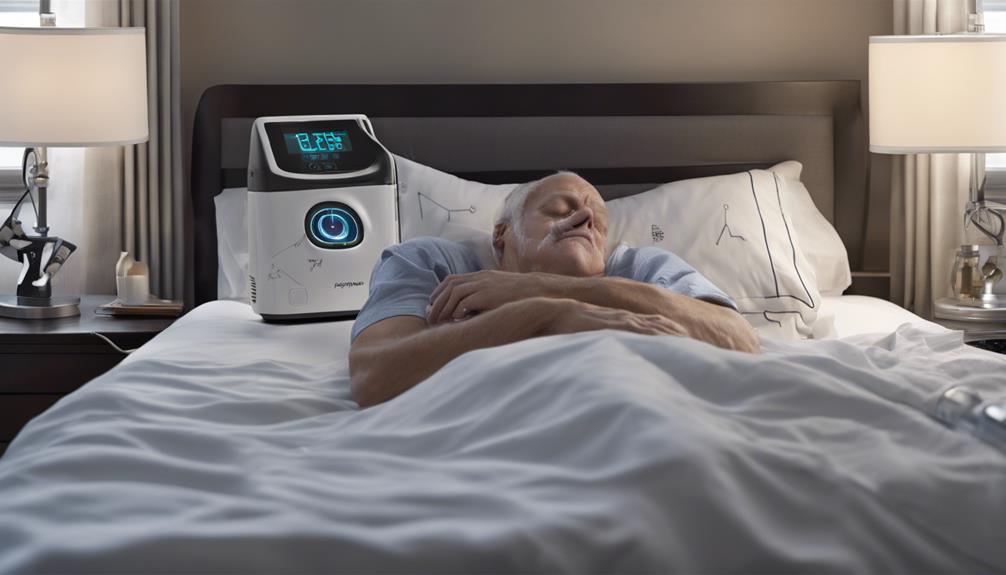
To effectively manage sleep apnea-related AFib, incorporating continuous positive airway pressure (CPAP) therapy is vital. This treatment approach has been shown to greatly reduce the recurrence of AFib in patients with sleep apnea. Alongside CPAP therapy, lifestyle modifications play an important role in managing sleep apnea and its impact on AFib.
Here are some key strategies to explore:
- Utilize CPAP Therapy: Consistently using a CPAP machine can help improve airflow during sleep, reducing the strain on the heart and lowering the risk of AFib recurrence.
- Implement Weight Loss Strategies: Losing weight can alleviate the symptoms of sleep apnea and decrease the likelihood of AFib episodes.
- Adopt Holistic Management Approaches: Combining CPAP therapy, lifestyle changes, and other recommended treatments like cardiac ablation can provide a well-rounded approach to managing AFib and sleep apnea effectively.
Importance of Screening for Sleep Apnea in AFib Patients

Screening for sleep apnea in AFib patients becomes imperative given the significant overlap in the prevalence of these conditions and the potential impact of undiagnosed sleep apnea on exacerbating AFib symptoms and complications. Undiagnosed sleep apnea can worsen AFib symptoms, leading to an increased risk of complications.
By identifying and treating sleep apnea early on, it's possible to improve AFib management and reduce the recurrence of arrhythmias. Various screening tools, such as questionnaires and sleep studies, are available to detect sleep apnea in AFib patients effectively.
Early detection of sleep apnea in AFib individuals can pave the way for personalized treatment plans tailored to their specific needs, ultimately resulting in better outcomes. Healthcare providers should prioritize screening for sleep apnea in AFib patients to ensure thorough care and effective management of both conditions.
Frequently Asked Questions
Can Atrial Fibrillation Be Caused by Sleep Apnea?
Yes, sleep apnea can cause atrial fibrillation. The stress on the heart during apnea episodes can lead to irregular heartbeats. Risk factors like hypertension and obesity also play a role. Disrupted oxygen levels and heart changes connect these conditions.
Detecting and managing sleep apnea early can reduce complications and prevent severe atrial fibrillation. Taking care of sleep apnea can greatly impact atrial fibrillation development.
Does Using a CPAP Machine Help With Afib?
Using a CPAP machine can help with AFib by improving oxygen levels during sleep, reducing stress on the heart. This can potentially decrease the risk of developing or worsening AFib.
CPAP therapy maintains regular breathing patterns, preventing interruptions that may trigger irregular heartbeats. Consistent CPAP use is linked to lower AFib recurrence rates.
Addressing sleep apnea with CPAP alongside other treatments like catheter ablation can enhance AFib management.
Can Sleep Apnea Cause V Fib?
No, sleep apnea doesn't directly cause ventricular fibrillation (V Fib), a serious arrhythmia affecting the heart's lower chambers.
While sleep apnea is linked to atrial fibrillation (AFib) due to oxygen deprivation, AFib primarily impacts the upper heart chambers.
Understanding these differences is essential for accurate diagnosis and treatment.
V Fib requires immediate medical intervention, like defibrillation, due to its chaotic electrical activity.
Sleep apnea isn't a direct cause of V Fib.
Is There a Relationship Between Sleep Apnea and Cardiac Arrhythmias?
Yes, there's a significant relationship between sleep apnea and cardiac arrhythmias. The stress on the heart due to breathing pauses in sleep apnea can lead to irregular heartbeats like AFib.
Disrupted oxygen levels over time from sleep apnea episodes contribute to the risk of developing cardiac arrhythmias. Shared risk factors such as hypertension and obesity further increase the likelihood of both conditions occurring.
It's essential to address sleep apnea to help manage and potentially prevent cardiac arrhythmias.
Conclusion
To sum up, grasping the connection between sleep apnea and AFib is essential for managing heart health. By understanding the mechanisms, impacts, and treatment options associated with these conditions, individuals can take proactive steps to improve their overall well-being.
Remember, early screening for sleep apnea in AFib patients can lead to better outcomes and quality of life. Stay informed, stay vigilant, and prioritize your heart health for a healthier tomorrow.
